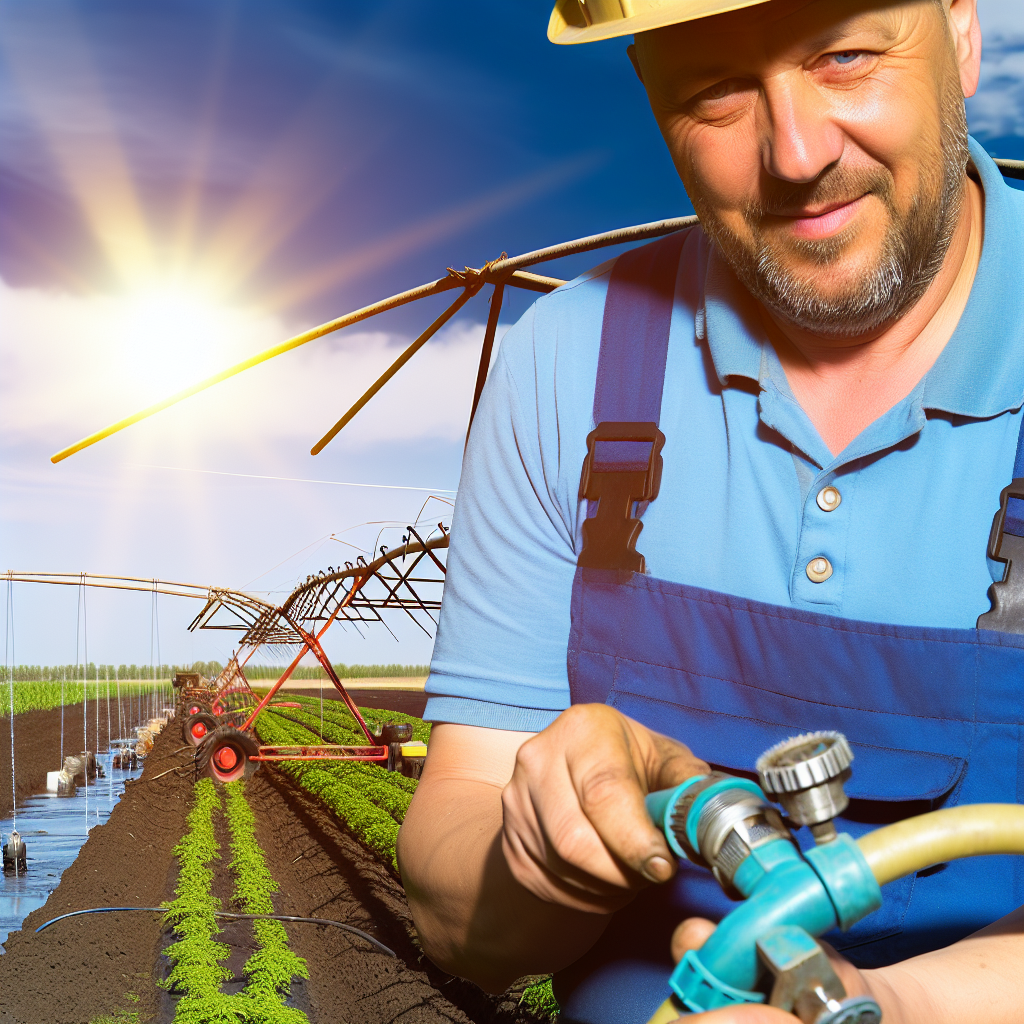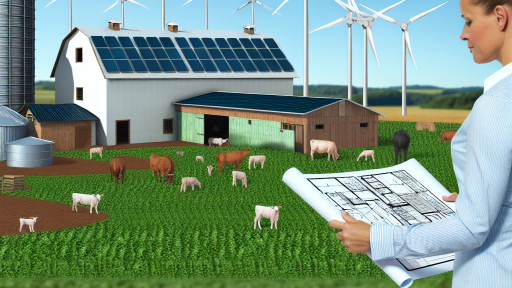Introduction to Water Conservation in Sustainable Farming
Water conservation plays a crucial role in sustainable farming practices.
The increasing demand for water poses significant challenges to agriculture.
Farmers must adopt effective strategies to manage water resources efficiently.
Implementing water conservation measures can enhance farm sustainability.
Importance of Water Conservation
Water conservation reduces the pressure on local water supply systems.
It helps maintain healthy ecosystems by preserving natural water bodies.
Moreover, conserving water can lead to cost savings for farmers.
In addition, efficient water management improves crop yields.
Challenges in Water Management
Farmers face various challenges in managing water resources.
Climate change significantly impacts rainfall patterns.
Soil degradation also affects water retention and availability.
Furthermore, a growing population increases competition for water resources.
Strategies for Effective Water Conservation
Adopting innovative practices is essential for water conservation.
Farmers can implement rainwater harvesting systems.
They should also consider using drip irrigation technology.
Transform Your Agribusiness
Unlock your farm's potential with expert advice tailored to your needs. Get actionable steps that drive real results.
Get StartedCrop rotation and soil cover practices can enhance soil moisture retention.
Rainwater Harvesting
Rainwater harvesting captures and stores rain for agricultural use.
This method reduces reliance on ground or surface water sources.
Farmers can install collection systems on rooftops and land surfaces.
Efficient Irrigation Systems
Modern irrigation systems minimize water waste.
Drip irrigation allows precise water delivery to plant roots.
Sprinkler systems can also be optimized for coverage and efficiency.
Soil Management Practices
Maintaining healthy soil is vital for water conservation.
Organic matter improves soil structure and moisture retention.
Cover crops can protect soil and enhance its water-holding capacity.
Community Involvement and Education
Engaging the community is vital for promoting water conservation.
Farmers should participate in workshops and knowledge-sharing sessions.
Local governments can support water conservation initiatives effectively.
Technological Innovations
Advancements in technology offer new solutions for water management.
Sensors and smart irrigation systems can optimize water use.
Data analytics can help farmers make informed irrigation decisions.
Implementing new technologies can significantly enhance water conservation efforts.
Importance of Water Conservation for Farm Sustainability
Enhancing Resource Efficiency
Water conservation significantly enhances resource efficiency on farms.
Farmers can reduce water waste while maximizing crop yields.
This efficiency leads to better profitability for agricultural operations.
Moreover, using water wisely minimizes the costs associated with irrigation.
Protecting Ecosystems
Conserving water helps protect local ecosystems.
Healthy ecosystems improve biodiversity on farms.
Thus, farmers can maintain a balanced environment for wildlife.
Showcase Your Farming Business
Publish your professional farming services profile on our blog for a one-time fee of $200 and reach a dedicated audience of farmers and agribusiness owners.
Publish Your ProfileThis practice fosters a resilient agricultural landscape.
Adapting to Climate Change
Climate change disrupts traditional farming practices.
Implementing water conservation strategies helps farms adapt.
By utilizing drought-resistant crops, farmers can mitigate risks.
Furthermore, these practices ensure water availability during dry spells.
Meeting Regulatory Requirements
Water conservation supports compliance with regulatory standards.
Governments increasingly mandate sustainable farming practices.
By conserving water, farmers align with those regulations.
Such compliance can also enhance a farm’s reputation.
Likewise, it could lead to financial incentives or grants.
Ensuring Long-Term Viability
Long-term sustainability depends on effective water management.
Farmers must plan for future water availability.
Implementing conservation strategies secures resources for generations.
This foresight ultimately leads to a more resilient agricultural system.
Integrated Water Resource Management in Agriculture
Defining Integrated Water Resource Management
Integrated Water Resource Management (IWRM) aims to manage water resources sustainably.
It combines technical, environmental, and social aspects of water management.
The approach seeks to balance water demand with supply.
Moreover, it promotes the equitable distribution of water among users.
Benefits of IWRM in Sustainable Farm Design
IWRM ensures efficient water use in agricultural practices.
It helps reduce water wastage and enhances farm productivity.
Additionally, this strategy supports ecosystem health by maintaining natural water cycles.
Integrated approaches lower the vulnerability of farms to water scarcity.
Key Principles of IWRM
IWRM is based on several key principles.
First, it emphasizes stakeholder participation in decision-making.
Second, it recognizes the importance of water, land, and related resources.
Furthermore, it promotes the use of local knowledge in planning efforts.
Implementing IWRM Strategies in Agriculture
Farmers can adopt various strategies for effective IWRM implementation.
They can utilize rainwater harvesting techniques on their farms.
Additionally, adopting integrated crop-livestock systems can enhance water efficiency.
Moreover, using technology contributes to smart irrigation practices.
Case Studies of Successful IWRM in Agriculture
Several farms worldwide have successfully implemented IWRM strategies.
For instance, the Haines family farm in Oregon uses precision agriculture technology.
This farm efficiently manages water while increasing crop yields.
Another example is the organic farm run by the Gonzalez family in California.
They have adopted drip irrigation systems that significantly reduce water use.
Challenges in Implementing IWRM
Despite its benefits, there are challenges in applying IWRM in agriculture.
Limited financial resources often hinder farmers’ ability to adapt.
Additionally, varying regional regulations can complicate implementation efforts.
Lastly, the need for education about IWRM practices remains significant.
See Related Content: Advantages of Diverse Crop Systems
Showcase Your Farming Business
Publish your professional farming services profile on our blog for a one-time fee of $200 and reach a dedicated audience of farmers and agribusiness owners.
Publish Your ProfileRainwater Harvesting Techniques for Sustainable Farms
Introduction to Rainwater Harvesting
Rainwater harvesting captures and stores rain for later use.
This technique supports sustainable farming practices effectively.
By utilizing rainwater, farms can reduce their dependence on municipal water.
Benefits of Rainwater Harvesting
This method conserves water and helps mitigate runoff.
Additionally, it reduces soil erosion and nutrient loss.
Moreover, harvested rainwater often contains fewer chemicals than tap water.
Key Components of a Rainwater Harvesting System
An effective system typically includes catchment areas, storage tanks, and filtration systems.
Catchment areas can be rooftops, pavements, or specialized surfaces.
Storage tanks can be above ground or below ground, depending on space and budget.
Filtration systems help improve water quality and ensure safe usage.
Catchment Areas
Choosing the right catchment area increases rainwater collection efficiency.
Rooftops are common, as they provide ample surface area.
Storage Solutions
Storage tanks should be sized based on anticipated rainfall and water needs.
Regular maintenance ensures these tanks remain functional and clean.
Best Practices for Implementation
- Conduct a site assessment to determine optimal setup.
- Calculate water needs to size the system accordingly.
- Incorporate treatment methods to maintain water quality.
Engaging local experts can enhance the system’s design and efficiency.
Case Studies of Successful Rainwater Harvesting
Many farms globally successfully integrate rainwater harvesting.
For instance, Green Valley Farms in Arizona captures approximately 50,000 gallons annually.
This practice helps them irrigate crops during dry seasons.
Effective Water Use in Agriculture
Incorporating rainwater harvesting yields numerous environmental benefits.
Farmers can enhance sustainability while promoting responsible water use.
As more farms adopt these practices, overall water conservation improves.
See Related Content: Gray Water Recycling Techniques for Agricultural Use
Drip Irrigation Systems: Efficiency and Benefits
Overview of Drip Irrigation
Drip irrigation delivers water directly to the plant roots.
This method minimizes evaporation and runoff.
As a result, it conserves water efficiently.
How Drip Irrigation Works
Drip systems use a network of tubes and emitters.
The emitters release water slowly and consistently.
This ensures that each plant receives adequate moisture.
Efficiency of Drip Irrigation
Drip irrigation can reduce water usage by up to 50%.
It also enhances nutrient delivery to plants.
Moreover, this system lowers the risk of diseases.
It leads to healthier crops and better yields.
Benefits to Sustainable Farming
Drip irrigation supports sustainable farming practices.
It minimizes water waste and promotes conservation.
This system is suitable for various crop types.
Farmers can adapt it to specific field conditions.
Economic Advantages
Farmers save on water costs with drip irrigation.
Initial investments pay off through increased yields.
Additionally, labor costs may decrease due to automation.
Implementation Requirements
Installing a drip irrigation system requires planning.
Showcase Your Farming Business
Publish your professional farming services profile on our blog for a one-time fee of $200 and reach a dedicated audience of farmers and agribusiness owners.
Publish Your ProfileFarmers must assess their specific needs carefully.
Also, maintenance is crucial for long-term success.
With the right approach, drip irrigation can transform farming.
Discover More: Integrating Circular Economy in Farm Waste Management
Soil Moisture Management Practices
Understanding Soil Moisture
Soil moisture plays a critical role in plant health.
It directly affects crop yields and agricultural productivity.
Effective management of soil moisture enhances sustainability.
Implementing Mulching Techniques
Mulching minimizes soil moisture evaporation.
This practice maintains consistent soil temperatures.
Additionally, organic mulch enriches soil as it decomposes.
Choose materials like straw or wood chips for effective results.
Utilizing Drip Irrigation
Drip irrigation delivers water directly to plant roots.
This method reduces water wastage significantly.
Moreover, it promotes healthier plant growth.
Adjust the system to ensure optimal water distribution.
Incorporating Soil Amendments
Adding organic matter improves soil structure.
This enhancement increases soil’s water retention capabilities.
Compost, for example, boosts both nutrient content and moisture levels.
Regular testing ensures balanced nutrient availability.
Monitoring Soil Moisture Levels
Utilize moisture sensors for real-time data.
This technology helps in making informed irrigation decisions.
Knowing when to water supports sustainable practices.
Proper monitoring can prevent overwatering and promote conservation.
Crop Selection and Rotation
Select drought-resistant crops to enhance moisture efficiency.
Crop rotation prevents soil depletion and promotes biodiversity.
Different plants have varying moisture needs, which aids in management.
Diverse cropping systems can optimize overall water use.
Contouring and Terracing
Implementing contour farming reduces runoff.
This practice improves soil moisture retention on slopes.
Terracing further enhances water conservation in hilly terrains.
Both methods aid in capturing rainwater effectively.
Adopting Cover Crops
Cover crops protect soil from erosion and retain moisture.
They also enhance soil fertility while storing water.
Planting legumes can fix nitrogen, benefiting future crops.
Incorporate these practices to improve soil health sustainably.
See Related Content: Soil Health Practices For Sustainable Farming

Use of Drought-Resistant Crop Varieties
Importance of Drought Resistance
Drought-resistant crops play a crucial role in sustainable farming.
They help minimize water usage during dry spells.
Farmers benefit by maintaining yields despite challenging weather conditions.
These crops can withstand prolonged periods without water.
Showcase Your Farming Business
Publish your professional farming services profile on our blog for a one-time fee of $200 and reach a dedicated audience of farmers and agribusiness owners.
Publish Your ProfileTypes of Drought-Resistant Crops
Various crop varieties exhibit drought resistance.
Corn and sorghum are popular choices among farmers.
Additionally, legumes thrive in low moisture environments.
Researchers are developing new varieties with enhanced resilience.
Benefits of Drought-Resistant Varieties
Drought-resistant crops lower irrigation demands.
This reduction helps conserve precious water resources.
Furthermore, they enhance soil health and prevent erosion.
This leads to sustainable practices that benefit the ecosystem.
Implementing Drought-Resistant Practices
Farmers should assess their unique growing conditions.
Selecting the right crop variety is essential.
Moreover, they should consider intercropping techniques.
These practices can further improve land efficiency.
Future Directions in Crop Development
Research continues to focus on improving drought resilience.
Biotechnology offers promising solutions in this area.
Engineered traits may enhance drought tolerance significantly.
Ultimately, breeding programs are crucial for developing robust varieties.
Role of Cover Crops in Water Conservation
Introduction to Cover Crops
Cover crops are vital in sustainable farming systems.
They improve soil health while conserving water effectively.
Farmers utilize various types of cover crops for multiple benefits.
Enhancing Soil Structure
Cover crops enhance soil structure significantly.
They improve soil aeration and water infiltration rates.
This results in better moisture retention over time.
Well-structured soil also supports beneficial microorganisms.
Reducing Erosion
Soyl erosion is a critical challenge in agriculture.
Cover crops play a crucial role in mitigating erosion.
They protect the soil surface from heavy rainfall impact.
Additionally, they hold soil in place with their root systems.
Improving Water Retention
One of the primary benefits of cover crops is increased water retention.
They create a green mulch that reduces evaporation rates.
This is particularly important during dry spells.
As a result, crops receive a consistent water supply.
Enhancing Nutrient Cycling
Cover crops boost nutrient cycling in the soil.
They absorb excess nutrients and prevent leaching.
This contributes to improved water quality in nearby sources.
Moreover, decomposing cover crops add organic matter back into the soil.
Promoting Biodiversity
Utilizing diverse cover crops promotes agricultural biodiversity.
This diversity supports various soil organisms and improves resilience.
Healthier soils lead to more robust plants that require less water.
Biodiversity enhances the sustainability of farming practices.
Case Studies and Success Stories
Many farmers witness success with cover crops in their fields.
Showcase Your Farming Business
Publish your professional farming services profile on our blog for a one-time fee of $200 and reach a dedicated audience of farmers and agribusiness owners.
Publish Your ProfileFor instance, Tyler Evans grew clover as a cover crop.
He noticed a significant reduction in irrigation needs.
Another example is Maria Gonzalez, who uses vetch.
Her soil moisture levels improved during drought conditions.
Implementing Cover Crops Effectively
Choosing the right cover crop is essential for success.
Farmers should consider their specific soil types and climate.
Additionally, the timing of planting and termination matters greatly.
Proper planning ensures maximum benefits from cover crops.
Future Directions for Cover Crop Implementation
Incorporating cover crops into farming practices is beneficial.
They effectively conserve water and enhance sustainable agriculture.
This practice supports both current and future farming needs.
Policy and Incentives for Water Conservation in Agriculture
Current Policies Supporting Water Conservation
Governments worldwide implement policies aimed at conserving water in agriculture.
These policies often include strict regulations on water usage.
Additionally, they promote the adoption of efficient irrigation techniques.
For instance, many regions enforce limits on groundwater extraction.
Such policies help sustain vital water resources for farming.
Moreover, these guidelines incentivize farmers to adopt sustainable practices.
Financial Incentives for Farmers
Financial support plays a crucial role in promoting water conservation.
Many governments provide grants and subsidies for water-efficient technologies.
Farmers can receive funding to implement drip irrigation systems.
Additionally, tax incentives often motivate investment in rainwater harvesting.
These measures help farmers reduce their operational costs.
Consequently, they further encourage the adoption of sustainable practices.
Education and Training Programs
Education is essential for effective water conservation strategies.
Many organizations offer training programs for farmers.
These programs focus on water management and efficient irrigation practices.
Farmers gain valuable knowledge about new technologies and methods.
As a result, they are more likely to adopt sustainable practices.
Furthermore, workshops can foster collaboration among farmers.
Collaborative Efforts for Water Management
Public-private partnerships enhance water conservation efforts.
These collaborations often lead to innovative solutions and funding opportunities.
For example, companies may work alongside farmers to develop new techniques.
Such initiatives can improve water use efficiency across farms.
Additionally, local communities can engage in shared water resource management.
This collective approach ensures sustainable water usage in agriculture.
Additional Resources
11 Ways Farmers Are Adapting to Climate Change | Earth.Org
What is Sustainable Agriculture? | Union of Concerned Scientists




